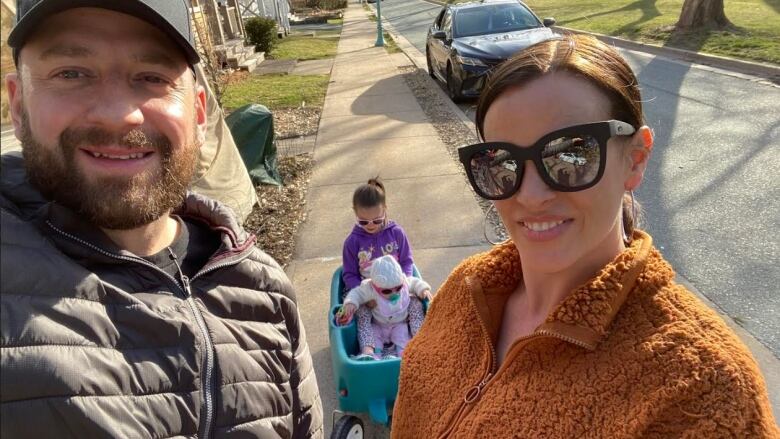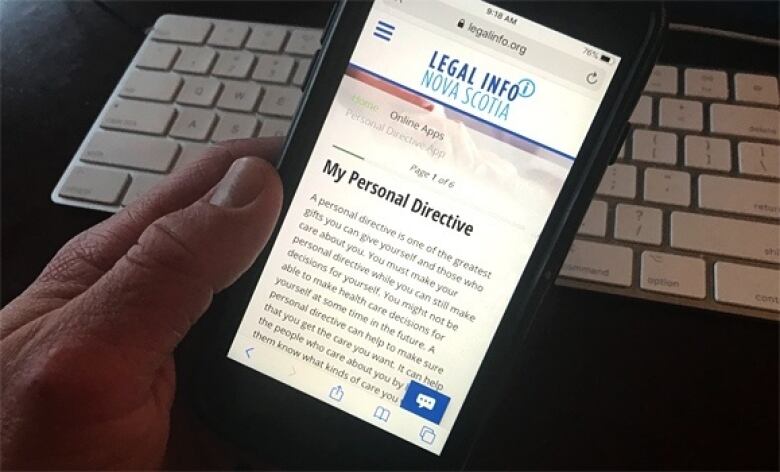Halifax parents rethink end-of-life decisions because of COVID-19
'I would think that our generation is going to wake up and everyone's going to be doing this'

Holly MacDonald recently turned 40and is on maternity leave during theCOVID-19 pandemic after having her second child with her partner, Troy Allen.
"It's such a scary time, especially when you have children and there's so much uncertainty," she said Wednesday, just four months after giving birth.
If she and her partner were to die from COVID-19, who would take care of their girls?
"Heaven forbid anything were to happen to Troy or I," MacDonald said.
Health used to be something the north-end Halifax parentstook for grantedthat is,until thepandemic. To regain a sense of control, they'reupdatingtheir will, and entrusting MacDonald'sparents with the care of their children if the unthinkable happened.
While they tried to keep the conversation with her parents light, she said it was difficult, but necessary.
"I would think that our generation is going to wake up and everyone's going to be doing this," MacDonald said.
It's impossible to know exactly how many people are creating or revising wills because they're private documents not registered with the province.
Wills establish how people want their personal property and financial assets handled after they die.
While some people might use wills to get their affairs in order,some people might employpersonal directives, which are legally binding documents that outline personal care decisions to be made when people are no longer mentally capable of making those decisions for themselves, says the province.
Also called an advance directive or a living will, these are only in effect when people are alive and mentally incapable.
Surge in interest in personal directives
Anonline tool from the Legal Information Society of Nova Scotia that allows Nova Scotians to create a personal directive has seen a big increase in usage since the first cases of COVID-19 werereported in Nova Scotia on March 15, with 475 personal directives being completed during that time.
The service has been available since September, but only about five people a month were completing a directive.
The intention was to officially unveil the app on April 16 to coincide with National Advance Care Planning Day, but with the COVID-19 pandemic, the people behindthe tool bumped up the official reveal a few weeks early.
Where the app came from
The app was created by Jocelyn Downie, a health policy professor at Dalhousie University's Schulich School of Law, and law graduate Victoria Apold.
The strong interest inthe app is "enormously gratifying" for Downie as it's turned her academic research into something useful for people "at an outrageously stressful time."

She thinks of a friend who had to make gut-wrenching health-care decisions many years ago without the assistance of a directive.
"If even one person can be protected from that trauma of feeling responsible for choosing the death of their loved one, that's worth it," she said.
Downie thinks of personal directivesas a "gift" that removes the burden of making life-and-death decisions away from not only loved ones, but also from health-care workers.

"It gives them certainty, takes away any potential for conflict or uncertainty about what somebody wanted," said Downie.
She's urging everyone to make their end-of-life health-care decisions known, as difficult as it might beto contemplate.
"It actually can give you comfort, and it gives you back a sense of control," Downiesaid.
MORE TOP STORIES












_(720p).jpg)


 OFFICIAL HD MUSIC VIDEO.jpg)
.jpg)



























































































